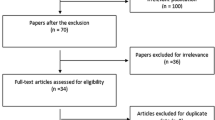Abstract
We conducted a comprehensive meta-analysis with all available data on the association of allele and genotype of peptidylarginine deiminases 4 (PADI4) polymorphisms with RA overall and in each ethnic population to explore whether the PADI4 polymorphisms confer susceptibility to RA. Nine comparisons, three Asians and six Europeans, from eight studies were included in this meta-analysis. Overall meta-analysis shows a significant association of PADI4_94, 104 and 90 with RA (OR = 1.20, 1.17, 1.35, P = 0.001, <0.0001, 0.006, respectively). There was a significant association with all of the PADI4 polymorphisms with RA in people of Asian descent. However, there was no significant association of PADI4 polymorphisms with RA in people of European descent, except for PADI_94. The presence of 2/2 genotype of the PADI4 significantly increased the risk for RA in European populations (OR = 2.10, 95% CI, 1.66–2.66, P < 0.0001) without between-study heterogeneity (I 2 = 44.3, P = 0.15). In conclusion, this meta-analysis demonstrates that the PADI4 polymorphisms may represent a significant risk factor for RA in Asians and Europeans and may play a larger role in susceptibility to RA in Asian than in European populations. Further studies are needed to see if the PADI4 gene confers a risk of RA in other ethnic groups.


Similar content being viewed by others
References
Harris ED Jr (1990) Rheumatoid arthritis. Pathophysiology and implications for therapy. N Engl J Med 322:1277–1289
MacGregor AJ, Snieder H, Rigby AS, Koskenvuo M, Kaprio J, Aho K et al (2000) Characterizing the quantitative genetic contribution to rheumatoid arthritis using data from twins. Arthritis Rheum 43:30–37
Wordsworth P, Bell J (1991) Polygenic susceptibility in rheumatoid arthritis. Ann Rheum Dis 50:343–346
Deighton CM, Walker DJ, Griffiths ID, Roberts DF (1989) The contribution of HLA to rheumatoid arthritis. Clin Genet 36:178–182
Schellekens GA, Visser H, de Jong BA, van den Hoogen FH, Hazes JM, Breedveld FC et al (2000) The diagnostic properties of rheumatoid arthritis antibodies recognizing a cyclic citrullinated peptide. Arthritis Rheum 43:155–163
Vossenaar ER, Zendman AJ, van Venrooij WJ, Pruijn GJ (2003) PAD, a growing family of citrullinating enzymes: genes, features and involvement in disease. Bioessays 25:1106–1118
Zhou Z, Menard HA (2002) Autoantigenic posttranslational modifications of proteins: does it apply to rheumatoid arthritis? Curr Opin Rheumatol 14:250–253
Suzuki A, Yamada R, Chang X, Tokuhiro S, Sawada T, Suzuki M et al (2003) Functional haplotypes of PADI4, encoding citrullinating enzyme peptidylarginine deiminase 4, are associated with rheumatoid arthritis. Nat Genet 34:395–402
Cornelis F, Faure S, Martinez M, Prud’homme JF, Fritz P, Dib C et al (1998) New susceptibility locus for rheumatoid arthritis suggested by a genome-wide linkage study. Proc Natl Acad Sci USA 95:10746–10750
Shiozawa S, Hayashi S, Tsukamoto Y, Goko H, Kawasaki H, Wada T et al (1998) Identification of the gene loci that predispose to rheumatoid arthritis. Int Immunol 10:1891–1895
Ikari K, Kuwahara M, Nakamura T, Momohara S, Hara M, Yamanaka H et al (2005) Association between PADI4 and rheumatoid arthritis: a replication study. Arthritis Rheum 52:3054–3057
Kang CP, Lee HS, Ju H, Cho H, Kang C, Bae SC (2006) A functional haplotype of the PADI4 gene associated with increased rheumatoid arthritis susceptibility in Koreans. Arthritis Rheum 54:90–96
Barton A, Bowes J, Eyre S, Spreckley K, Hinks A, John S et al (2004) A functional haplotype of the PADI4 gene associated with rheumatoid arthritis in a Japanese population is not associated in a United Kingdom population. Arthritis Rheum 50:1117–1121
Martinez A, Valdivia A, Pascual-Salcedo D, Lamas JR, Fernandez-Arquero M, Balsa A et al (2005) PADI4 polymorphisms are not associated with rheumatoid arthritis in the Spanish population. Rheumatology (Oxford) 44:1263–1266
Plenge RM, Padyukov L, Remmers EF, Purcell S, Lee AT, Karlson EW et al (2005) Replication of putative candidate-gene associations with rheumatoid arthritis in >4,000 samples from North America and Sweden: association of susceptibility with PTPN22, CTLA4, and PADI4. Am J Hum Genet 77:1044–1060
Caponi L, Petit-Teixeira E, Sebbag M, Bongiorni F, Moscato S, Pratesi F et al (2005) A family based study shows no association between rheumatoid arthritis and the PADI4 gene in a white French population. Ann Rheum Dis 64:587–593
Egger M, Smith GD, Phillips AN (1997) Meta-analysis: principles and procedures. BMJ 315:1533–1537
Higgins JP, Thompson SG (2002) Quantifying heterogeneity in a meta-analysis. Stat Med 21:1539–1558
DerSimonian R, Laird N (1986) Meta-analysis in clinical trials. Control Clin Trials 7:177–188
Barton A, Bowes J, Eyre S, Symmons D, Worthington J, Silman A (2005) Investigation of polymorphisms in the PADI4 gene in determining severity of inflammatory polyarthritis. Ann Rheum Dis 64:1311–1315
Harney SM, Meisel C, Sims AM, Woon PY, Wordsworth BP, Brown MA (2005) Genetic and genomic studies of PADI4 in rheumatoid arthritis. Rheumatology (Oxford) 44:869–872
Hoppe B, Haupl T, Gruber R, Kiesewetter H, Burmester GR, Salama A et al (2006) Detailed analysis of the variability of peptidylarginine deiminase type 4 in German patients with rheumatoid arthritis: a case-control study. Arthritis Res Ther 8:R34
Ioannidis JP, Ntzani EE, Trikalinos TA, Contopoulos-Ioannidis DG (2001) Replication validity of genetic association studies. Nat Genet 29:306–309
Iwamoto T, Ikari K, Nakamura T, Kuwahara M, Toyama Y, Tomatsu T et al (2006) Association between PADI4 and rheumatoid arthritis: a meta-analysis. Rheumatology 45:804–807
Author information
Authors and Affiliations
Corresponding author
Rights and permissions
About this article
Cite this article
Lee, Y.H., Rho, Y.H., Choi, S.J. et al. PADI4 polymorphisms and rheumatoid arthritis susceptibility: a meta-analysis. Rheumatol Int 27, 827–833 (2007). https://doi.org/10.1007/s00296-007-0320-y
Received:
Accepted:
Published:
Issue Date:
DOI: https://doi.org/10.1007/s00296-007-0320-y




